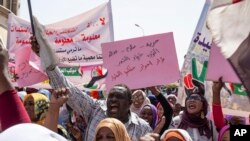VOA’s Nabeel Biajo spoke with Abdullahi Ali Ibrahim, professor emeritus of African and Islamic History at the University of Missouri, who said military rule is no longer viable in Sudan.
Despite the 2021 military coup of General Abdel-Fattah al-Burhan, Ibrahim said, young people yearning for democracy in Sudan are determined to change the future of governance in their country.
The interview was edited for brevity and clarity.
VOA: Sudanese have celebrated October for decades as a reminder that the will of the people prevails over military authoritarianism. What are your reflections this year given Sudan’s current political and governance crisis?
Ibrahim: October is the mother of evolutions. So we have October [1964], then we have the one that happened in April 1985, then you have the last one in December 2018. So, we have a pattern here, a pattern of the determination, the will of the people to live in a democracy and this will has been tampered with, destroyed a couple of times. This pattern is pregnant with meaning that the will of the people, that building a nation is not a one-episode thing. It’s a long call. So, when we celebrate October, we're really celebrating the origin of this determination to build a democratic system in Sudan.
VOA: In October 1964, Sudanese protesters overthrew the first military dictator in independent Sudan, General Ibrahim Aboud. Fast forward to October 2021, the military took back power after protesters overthrew the last military dictator, General Omar al-Bashir in April 2019 who ruled for 30 years. What have we learned about military-civilian relations in Sudan?
Ibrahim: It is not just about the military, as you can see from the kind of the forces that are called upon by the military to support them. We are talking about a conservative patriarchal force or group or component. It’s a military government, but it is representing the interests of a class of people. An ideology of patriarchy just does not want to disappear because we had a military that came in 1969 with leftist tendencies. So, we didn't have the same military all the time.
VOA: The military has ruled Sudan for the majority of its independence since 1956 with only brief periods of democratic civilian parliamentary rule. What does it take to break this cycle of military coups in Sudan?
Ibrahim: We need to look at the dynamics of the alliances between the military and the civilians in the military setting itself because during [Jaafar] Nimeiri’s period [1969-1985] you have liberals, leftists, independents, bureaucrats all supporting a military government, and the same people revolted against the regime when it went astray and turned into a theocracy. So, the first thing is to clear up this misunderstanding that it is a natural political switching from military to civilian [rule] because that divides society into military and civilians, which is not real.
VOA: How do you see the current situation in Sudan with the military in power ending, and what is the future of governance in Sudan in general?
Ibrahim: There is this consensus that the military has run its course. The military itself is not the military [anymore] because now you have the Rapid Support Force. Its involvement in politics has caused a lot of harm. The professional army is no longer the only army in the country that is an important aspect of that we might be witnessing the last coup. We reached a point at which democracy is not just a call for a good form of governance. People just don't want to be lorded over anymore, they don’t want to be ordered around — in the family, in school, in the job.





![October Rekindles Sudan's Yearning for Democracy: Analyst [6:26] October Rekindles Sudan's Yearning for Democracy: Analyst [6:26]](https://gdb.voanews.com/c3c50000-0aff-0242-877f-08d9ed5ca6cf_w250_r1.jpg)
